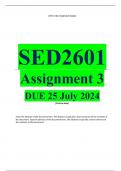[TYPE THE COMPANY NAME]
SED2601
Assignment 3
DUE 25 July 2024 [Pick the date]
[Type the abstract of the document here. The abstract is typically a short summary of the contents of
the document. Type the abstract of the document here. The abstract is typically a short summary of
the contents of the document.]
, Exam (elaborations)
SED2601 Assignment 3 (COMPLETE ANSWERS) 2024 -
DUE 25 July 2024
Course
Sociology of Education (SED2601)
Institution
University Of South Africa
Book
Sociology of Education
SED2601 Assignment 3 (COMPLETE ANSWERS) 2024 - DUE 25 July
2024 ;100 % TRUSTED workings, explanations and solutions. ..
Question 1 1.1 Discuss what is meant by the following: a) Modern democracy
(3) b) Citizenship education (3) 8
1.1 Understanding Key Concepts
a) Modern Democracy
Modern democracy refers to a system of government where power is vested in the hands of the
people, who exercise that power directly or through elected representatives. Modern democracy
encompasses several key principles and characteristics:
1. Popular Sovereignty:
o Explanation: The ultimate authority in a modern democracy rests with the
people. Citizens have the right to participate in the political process through
voting, referendums, and other forms of civic engagement.
o Example: Regular free and fair elections allow citizens to choose their leaders
and hold them accountable.
2. Rule of Law:
, o Explanation: Modern democracies operate under a system of laws that apply
equally to all individuals, ensuring fairness and justice. The rule of law protects
individual rights and limits the power of government.
o Example: Independent judiciary systems that can review and overturn laws and
actions that violate the constitution.
3. Protection of Individual Rights and Freedoms:
o Explanation: Modern democracies safeguard fundamental human rights and
freedoms, such as freedom of speech, religion, and assembly.
o Example: Constitutional protections that guarantee freedom of the press,
allowing media to operate without government interference.
4. Pluralism and Inclusivity:
o Explanation: Modern democracies embrace diversity and encourage the
participation of all groups in society, including minorities and marginalized
communities.
o Example: Laws and policies that promote equal opportunities and representation
for women, ethnic minorities, and other underrepresented groups.
b) Citizenship Education
Citizenship education refers to the process of educating individuals, particularly young people,
about their rights, responsibilities, and roles as citizens within a democratic society. It aims to
prepare individuals to actively participate in civic life and contribute to the democratic process.
Key components of citizenship education include:
1. Knowledge of Civic Institutions and Processes:
o Explanation: Citizenship education provides students with an understanding of
how government institutions function, the electoral process, and the importance of
the rule of law.
o Example: Teaching students about the structure of government, the role of the
judiciary, and the process of passing laws.
2. Development of Critical Thinking and Decision-Making Skills:
o Explanation: Citizenship education encourages critical thinking and informed
decision-making, enabling individuals to analyze political issues, evaluate
different perspectives, and make reasoned judgments.
o Example: Classroom debates on current events where students must research and
defend various viewpoints on social and political issues.
3. Promotion of Active Participation and Engagement:
o Explanation: Citizenship education emphasizes the importance of active
participation in community and civic activities, fostering a sense of responsibility
and engagement.
o Example: Encouraging students to participate in community service projects,
student government, and other civic activities to experience firsthand the impact
of civic engagement.
4. Fostering a Sense of Identity and Belonging:




